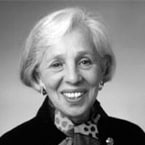
Maxine Frank Singer, PhD, FAACR, former president of the Carnegie Institution of Science and former chief of the Laboratory of Biochemistry at the National Cancer Institute, died July 9, 2024. She was 93.
Singer was known for her seminal research involving RNA synthesis and subsequent studies related to defining the genetic code and recombinant DNA technologies, and for fundamental contributions to the understanding of long interspersed nucleotide elements (LINE) and their role in genomic transposition and cancer initiation.
While her work helped advance the field of recombinant DNA technology, Singer was aware of the moral and ethical issues surrounding genetic engineering. As a participant of the Asilomar Conference on Recombinant DNA convened by her friend and collaborator, Paul Berg, a Fellow of the AACR Academy, she helped define guidelines for oversight of this technology that were used by the National Institutes of Health and other organizations around the world.
She was born in New York City in 1931 and graduated from Swarthmore College in 1952 with a bachelor’s degree in chemistry. She earned a doctorate in biochemistry from Yale University in 1957.
Singer joined the Laboratory of Biochemistry headed by Leon Heppel at the National Institutes of Health in 1956. She moved to the National Cancer Institute in 1975 as chief of the Nucleic Acid Enzymology Section at its Laboratory of Biochemistry. In 1980, she was named chief of the laboratory, overseeing 15 research groups.
In 1988, she was named president of the Carnegie Institution of Science in Washington (now called Carnegie Science), the first woman to serve in that role. She retired from Carnegie in 2002.
During her tenure as Carnegie Science president, Singer created several educational and outreach programs in the nation’s capital to improve access to scientific training for women and other historically underrepresented groups. Her efforts to provide students and teachers with high-quality STEM education resources continued long after her retirement from Carnegie.
Singer received the National Medal of Science from President George Bush in 1992. In 1999, she was the first woman to receive the Vannevar Bush Award from the National Science Board, and she was awarded the Public Welfare Medal of the National Academy of Sciences in 2007.
She was elected a Fellow of the American Academy of Arts and Sciences in 1978 and a member of the American Philosophical Society in 1990. In 2022, she was inducted as a Fellow of the AACR Academy.
Leave your remembrance of Dr. Singer below (limit 1,000 characters).
Be the first to add a Remembrance.